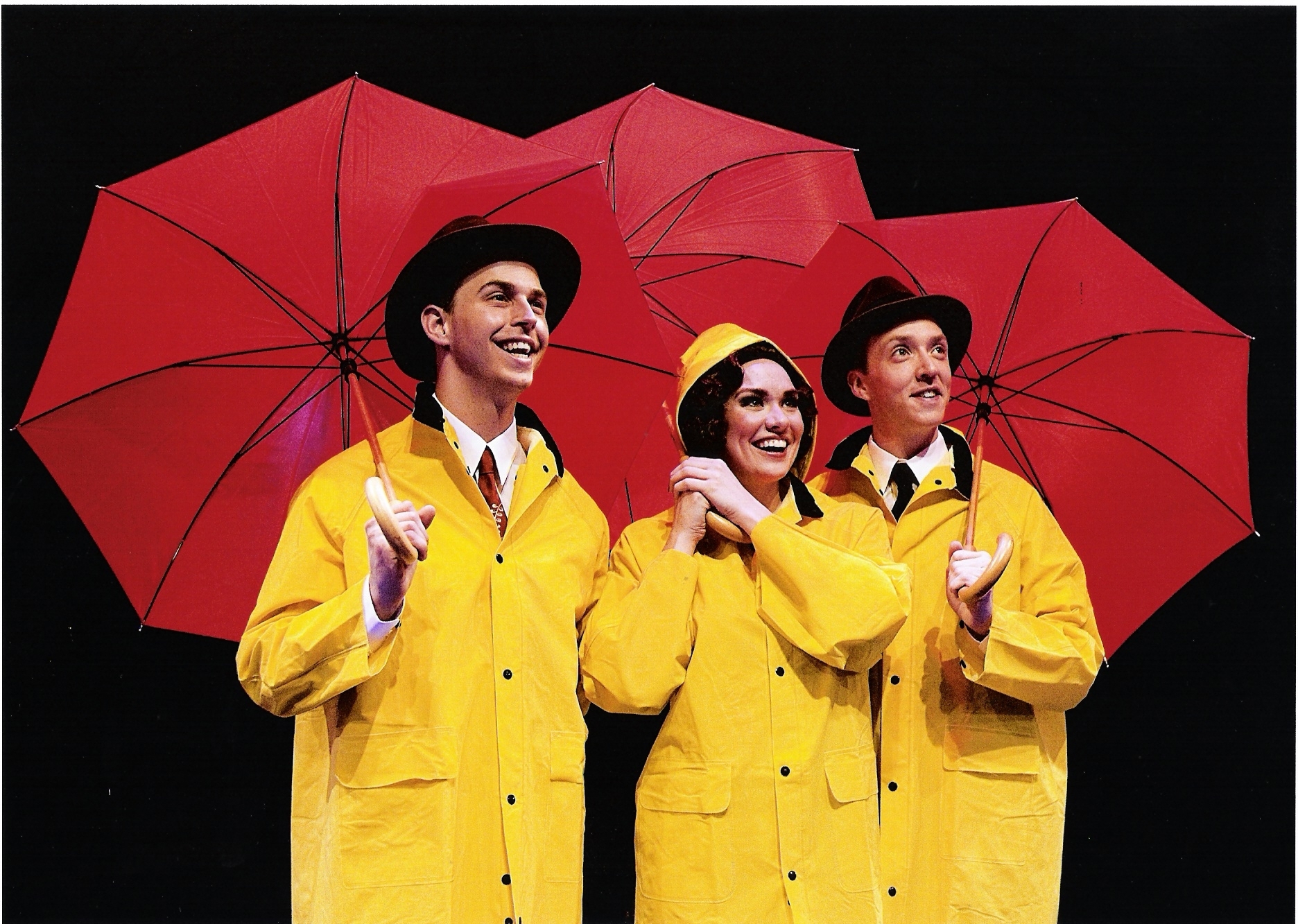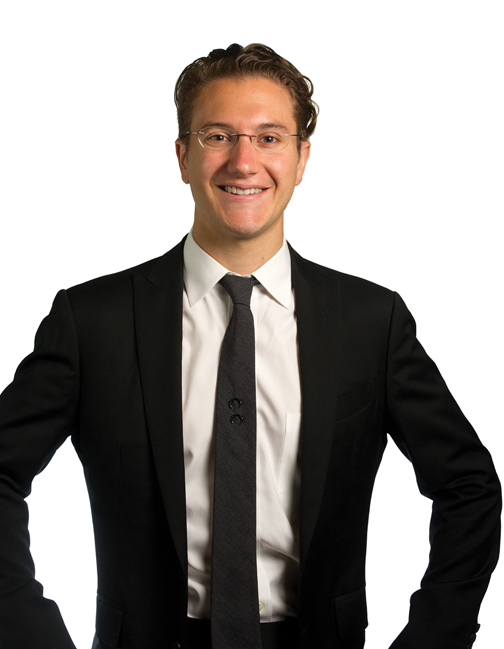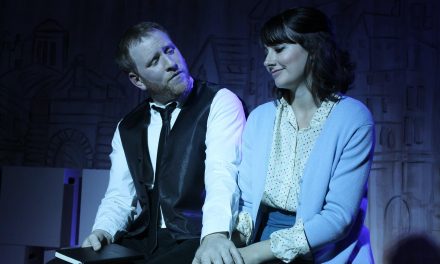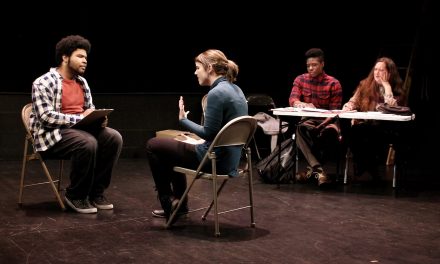Rebecca Willenbrink & Eli Keel in The Stranger and Ludlow Quinn
Photo-Theatre [502]
The Stranger and Ludlow Quinn: The Complete Saga
By Diana Grisanti and Steve Moulds
Directed by Amy Attaway
Review by Keith Waits
Entire contents copyright © 2014 by Keith Waits. All rights reserved.
Finales of serial storytelling have been much discussed of late, with recent months having seen one of the most satisfying final episodes of a television series and, only days ago, one of the most frustrating and divisive. The routine of regularly scheduled visits to a continuing story and characters can clearly be a challenge when time comes to wrap it all up. The expectations can be daunting and not always in tune with the creator’s intention. If comparing live theatre to television offends you, I resort to it in part because serial theatre is a rare animal and I have no other reference immediately available to me. But I think the parallel is an apt one, at least if you have followed all of the episodes of The Stranger and Ludlow Quinn, which I have. In fact, it sometimes felt like a throwback to the old days of “destination” television before the advent of VCR’s and TiVo made schedules superfluous. If you did not make it to First Fridays at The Baron’s Theatre, then buddy, you missed out.
Because I cannot help but observe that the monthly chapters were a little more fun, yet it is evident that writers Diana Grisanti and Steve Moulds, along with director Amy Attaway (Gil Reyes directed some early chapters, but Ms. Attaway has largely been the presiding director) have been attuned to how Ludlow Quinn has played with audiences along the way, even though, like any good magician, they are loathe to reveal their secrets, and have used those powers of observation in fashioning this “Complete Saga”.
For anyone unfamiliar with the premise, Ludlow Quinn is a failed magician in early 20th century Louisville who makes a deal with a mysterious stranger to trade his soul for the skills to be the world’s greatest prestidigitator. When a girl named Bonnie Burke finds, in 2013, an aged tome authored by Ludlow, she becomes inextricably drawn into his story. The play is inspired by its venue, The Baron’s Theatre, which is trickled out nicely as an intimate setting and decorated with vintage magic posters from the time of Ludlow Quinn.
Seeing the scenario played out in one evening brought mixed emotions. A certain amount of charm was sacrificed with the loss of the clever methods employed to synopsize earlier chapters, and an overreliance on spoken narration that seemed crucial to the episodic structure now seems to test the audience’s patience a bit and underscore how talky the script is. And the delicious expectation of earned knowledge carried over a month’s time is sadly removed when the story is broken down in two hours.
Yet there is also a focus on the narrative through-line and a renewed emphasis on theme that results from the condensed adaptation. The “full Ludlow” seems more urgently about Bonnie Burke and Ludlow Quinn than ever before, and we now see their relationship in more lucid terms. That arrogance, hubris, and a quest for immortality are the engines that drive the plot are delineated with clarity that has been somewhat elusive in monthly chapters. While the first act sometimes felt belabored with set-up, the second act brought satisfying pay-off, even with all the fourth-wall breaking narration. Bonnie’s discovery of her past develops and enriches her sense of self, and at the end she seems ready for new adventures.
The weight of exposition does point out just how ambitious was the writing, yet the production manages to avoid feeling overstuffed. This is, after all, ten 15-minute chapters judiciously cut down and reshaped into a fairly continuous 2-act narrative. It was difficult to find any drastic changes to the story; although the middle played differently for reasons I cannot quite put my finger on. Some necessary recasting helped to illuminate character identities that are emphasized in this structure as well.
Rebecca Willenbrink as Bonnie Burke and Eli Keel as Ludlow Quinn dominate with strong performances, and are revealed to be more of a team than the chapters allowed, and there is nice contrast between the earnest bravery and dogged detective instincts of Bonnie and Ludlow’s bombast and overblow sense of self. His search for identity strikes me as more vital now and the character more fully developed and sympathetic. Leah Roberts returns as The Stranger, who raises another question of identity that cannot be fully explored without spoilers. Gil Reyes and Robert McFarland are new to the cast as narrators who have an unexpected role to play in the proceedings, as is Jay Schwandt, who also provides nice melodramatic period piano music. They all do fine work substituting for equally fine original cast members. Returning veterans such as Alexandra Sweatt, Catherine Young, and Jessica May are steady in continuing their good efforts, and Zachary Burrell remains a memorable Erich Weiss, who plays a key role in Ludlow’s story.
At the end, as promised, a new, “final” chapter (it goes to “11”) delivers a gratifying resolution to the conspiracy and conflict, and most questions are answered… I think. You take The Stranger and Ludlow Quinn for granted at your own peril. It is a light entertainment that touches upon some pretty weighty themes and, like magic, always appears to deliver more than expected.
The Stranger and Ludlow Quinn: The Complete Saga
April 2, 4,18,19 & 21, 2014 @ 8:00pm
Theatre [502]
The Baron’s Theatre
131 East Main Street
Louisville, KY 40202
Theatre [502].org





